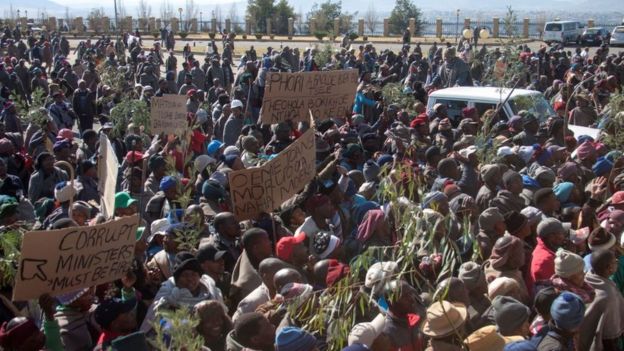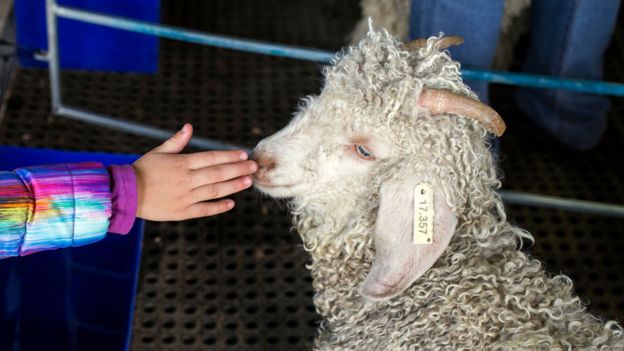
Audio By Carbonatix
A sitting of Lesotho's upper house of parliament this week degenerated into a fist-fight between massed ranks of rival MPs who also threw wooden panels, documents and anything else they could get their hands on across the chamber at each other.
The scuffle happened during a debate over a long-running dispute over new regulations around the wool and mohair trade - not the subject you might expect to ignite such strong passions.

 Image copyrightGETTY IMAGES
Earlier this year, thousands of farmers marched to parliament to protest against a regulation signed in 2018 forcing them to sell their wool and mohair to a Chinese broker.
The farmers said that the new broker was not paying them for their goods.
This led to a crisis that left an estimated 48,000 farmers without earnings for more than a year, according to South Africa's BusinessLive newspaper.
After numerous protests in the months after that, the government, led by Prime Miniser Tom Thabane, changed its tune and ended the controversial deal with Guohui Shi and his company, Lesotho Wool Centre.
Image copyrightGETTY IMAGES
Earlier this year, thousands of farmers marched to parliament to protest against a regulation signed in 2018 forcing them to sell their wool and mohair to a Chinese broker.
The farmers said that the new broker was not paying them for their goods.
This led to a crisis that left an estimated 48,000 farmers without earnings for more than a year, according to South Africa's BusinessLive newspaper.
After numerous protests in the months after that, the government, led by Prime Miniser Tom Thabane, changed its tune and ended the controversial deal with Guohui Shi and his company, Lesotho Wool Centre.
 Image copyrightGETTY IMAGES
Image captionAngry farmers took to the streets of the capital, Maseru, in June
Lesotho's farmers say the government's refusal to allow producers to sell their products in South Africa and elsewhere means they cannot get fair market prices.
They used to rely on a South African broker, BKB, to export their products seemingly without any problems. They now want to either return to that arrangement or be allowed to sell to alternative markets.
In October, lawmakers called for the regulations to be repealed but a new deal is yet to be finalised.
Image copyrightGETTY IMAGES
Image captionAngry farmers took to the streets of the capital, Maseru, in June
Lesotho's farmers say the government's refusal to allow producers to sell their products in South Africa and elsewhere means they cannot get fair market prices.
They used to rely on a South African broker, BKB, to export their products seemingly without any problems. They now want to either return to that arrangement or be allowed to sell to alternative markets.
In October, lawmakers called for the regulations to be repealed but a new deal is yet to be finalised.
 Image copyrightAFP
Image captionAn Angora goat needs to be sheared twice a year because its hair grows 12-15cm every six months
Farmers back in Lesotho, and opposition MPs, are worried that if they continue to only sell their produce from their own country, buyers might move elsewhere because of the increased travel costs involved.
While there are other tensions between the government and opposition, this week's sitting was expected to start addressing the concerns raised over existing regulations.
Opposition leaders grew frustrated when they learned Minister for Small Business Development, Conservation and Marketing Chalane Phoro would not be appearing in parliament, as they had expected, to explain what was happening with the regulations.
Then the speaker of parliament suspended the session, sparking uproar.
Image copyrightAFP
Image captionAn Angora goat needs to be sheared twice a year because its hair grows 12-15cm every six months
Farmers back in Lesotho, and opposition MPs, are worried that if they continue to only sell their produce from their own country, buyers might move elsewhere because of the increased travel costs involved.
While there are other tensions between the government and opposition, this week's sitting was expected to start addressing the concerns raised over existing regulations.
Opposition leaders grew frustrated when they learned Minister for Small Business Development, Conservation and Marketing Chalane Phoro would not be appearing in parliament, as they had expected, to explain what was happening with the regulations.
Then the speaker of parliament suspended the session, sparking uproar.
 Image copyrightLESOTHO PARLIAMENT
Image captionThe rival groups of MPs confronted each other in the chamber
Image copyrightLESOTHO PARLIAMENT
Image captionThe rival groups of MPs confronted each other in the chamber
First off, what is mohair?
Mohair is made from the hair of Angora goats. It is much softer than wool and has a noticeable sheen and lustre. Because it is considered to be a luxury textile, garments made entirely from mohair are more expensive than those made from other types of yarn. Some call it the "diamond fibre".But why fight over it?
Mohair and wool production is one of Lesotho's main industries and is the main source of income for many families.
More about mohair
 Image copyrightGETTY IMAGES
Earlier this year, thousands of farmers marched to parliament to protest against a regulation signed in 2018 forcing them to sell their wool and mohair to a Chinese broker.
The farmers said that the new broker was not paying them for their goods.
This led to a crisis that left an estimated 48,000 farmers without earnings for more than a year, according to South Africa's BusinessLive newspaper.
After numerous protests in the months after that, the government, led by Prime Miniser Tom Thabane, changed its tune and ended the controversial deal with Guohui Shi and his company, Lesotho Wool Centre.
Image copyrightGETTY IMAGES
Earlier this year, thousands of farmers marched to parliament to protest against a regulation signed in 2018 forcing them to sell their wool and mohair to a Chinese broker.
The farmers said that the new broker was not paying them for their goods.
This led to a crisis that left an estimated 48,000 farmers without earnings for more than a year, according to South Africa's BusinessLive newspaper.
After numerous protests in the months after that, the government, led by Prime Miniser Tom Thabane, changed its tune and ended the controversial deal with Guohui Shi and his company, Lesotho Wool Centre.
So the farmers should be happy?
Unfortunately not. While the deal with the Chinese businessman is no longer in place, what has remained is a decision for mohair and wool to be auctioned from Lesotho instead of neighbouring South Africa which had been the practice for many years. Image copyrightGETTY IMAGES
Image captionAngry farmers took to the streets of the capital, Maseru, in June
Lesotho's farmers say the government's refusal to allow producers to sell their products in South Africa and elsewhere means they cannot get fair market prices.
They used to rely on a South African broker, BKB, to export their products seemingly without any problems. They now want to either return to that arrangement or be allowed to sell to alternative markets.
In October, lawmakers called for the regulations to be repealed but a new deal is yet to be finalised.
Image copyrightGETTY IMAGES
Image captionAngry farmers took to the streets of the capital, Maseru, in June
Lesotho's farmers say the government's refusal to allow producers to sell their products in South Africa and elsewhere means they cannot get fair market prices.
They used to rely on a South African broker, BKB, to export their products seemingly without any problems. They now want to either return to that arrangement or be allowed to sell to alternative markets.
In October, lawmakers called for the regulations to be repealed but a new deal is yet to be finalised.
Why do they want to sell their mohair in South Africa?
Lesotho is a small landlocked country, with a population of just two million, and the partnership with South Africa gave producers access to a broader market, they say. It is one of southern Africa's poorest nations, with unemployment rates of 24-28%, according to the World Bank. Neighbouring South Africa produces 53% of the world's mohair and runs the world's biggest auction in the coastal town of Port Elizabeth in the Eastern Cape province. Image copyrightAFP
Image captionAn Angora goat needs to be sheared twice a year because its hair grows 12-15cm every six months
Farmers back in Lesotho, and opposition MPs, are worried that if they continue to only sell their produce from their own country, buyers might move elsewhere because of the increased travel costs involved.
While there are other tensions between the government and opposition, this week's sitting was expected to start addressing the concerns raised over existing regulations.
Opposition leaders grew frustrated when they learned Minister for Small Business Development, Conservation and Marketing Chalane Phoro would not be appearing in parliament, as they had expected, to explain what was happening with the regulations.
Then the speaker of parliament suspended the session, sparking uproar.
Image copyrightAFP
Image captionAn Angora goat needs to be sheared twice a year because its hair grows 12-15cm every six months
Farmers back in Lesotho, and opposition MPs, are worried that if they continue to only sell their produce from their own country, buyers might move elsewhere because of the increased travel costs involved.
While there are other tensions between the government and opposition, this week's sitting was expected to start addressing the concerns raised over existing regulations.
Opposition leaders grew frustrated when they learned Minister for Small Business Development, Conservation and Marketing Chalane Phoro would not be appearing in parliament, as they had expected, to explain what was happening with the regulations.
Then the speaker of parliament suspended the session, sparking uproar.
 Image copyrightLESOTHO PARLIAMENT
Image captionThe rival groups of MPs confronted each other in the chamber
Image copyrightLESOTHO PARLIAMENT
Image captionThe rival groups of MPs confronted each other in the chamber
So what happens now?
That is not entirely clear. There is still a dispute of over the mohair regulations and, once the dust has settled, this will need to be resolved by the very people who came to blows. In the meantime, the many hundreds of families in Lesotho who depend on mohair for their living will be hoping those in leadership positions can put their fists away long enough to come to a decision.DISCLAIMER: The Views, Comments, Opinions, Contributions and Statements made by Readers and Contributors on this platform do not necessarily represent the views or policy of Multimedia Group Limited.
DISCLAIMER: The Views, Comments, Opinions, Contributions and Statements made by Readers and Contributors on this platform do not necessarily represent the views or policy of Multimedia Group Limited.
Latest Stories
-
GNFS to launch automated fire safety compliance system to modernise regulation
2 minutes -
NALAG president commends Local Gov’t Minister for payment of assembly members’ allowances
4 minutes -
Is having a physical security operations center in your business worth it?
8 minutes -
Asiedu Nketia recounts fierce political wars in Ajumako-Enyan-Essiam constituency
13 minutes -
NRSA sets up committee to probe road crashes involving Toyota Voxy
29 minutes -
Cocoa farmers decry the adverse impact of producer price cut on livelihoods
36 minutes -
Families who lose relatives to ‘no bed syndrome’ must sue health facilities – Dr. Nawaane
36 minutes -
Ghana Sports Fund: Dr. David Kofi Wuaku outlines vision for Youth Empowerment growth through sports
49 minutes -
NUGS President urges sustainable digital governance
52 minutes -
National Investment Bank kicks off Ghana Sports Fund with landmark seed donation
55 minutes -
Two young siblings found dead in unsecured manhole
1 hour -
Cocoa Prices, Producer Prices, and the Smuggling Debate: What the data actually suggests
1 hour -
CRAG signs vehicle finance deal with Bank of Africa to boost fleet expansion
1 hour -
Cocoa price cut best policy decision to transform sector – Majority
2 hours -
Gunnyboy emerges as one of Ghana’s fast-rising dancehall voices in 2026
2 hours
